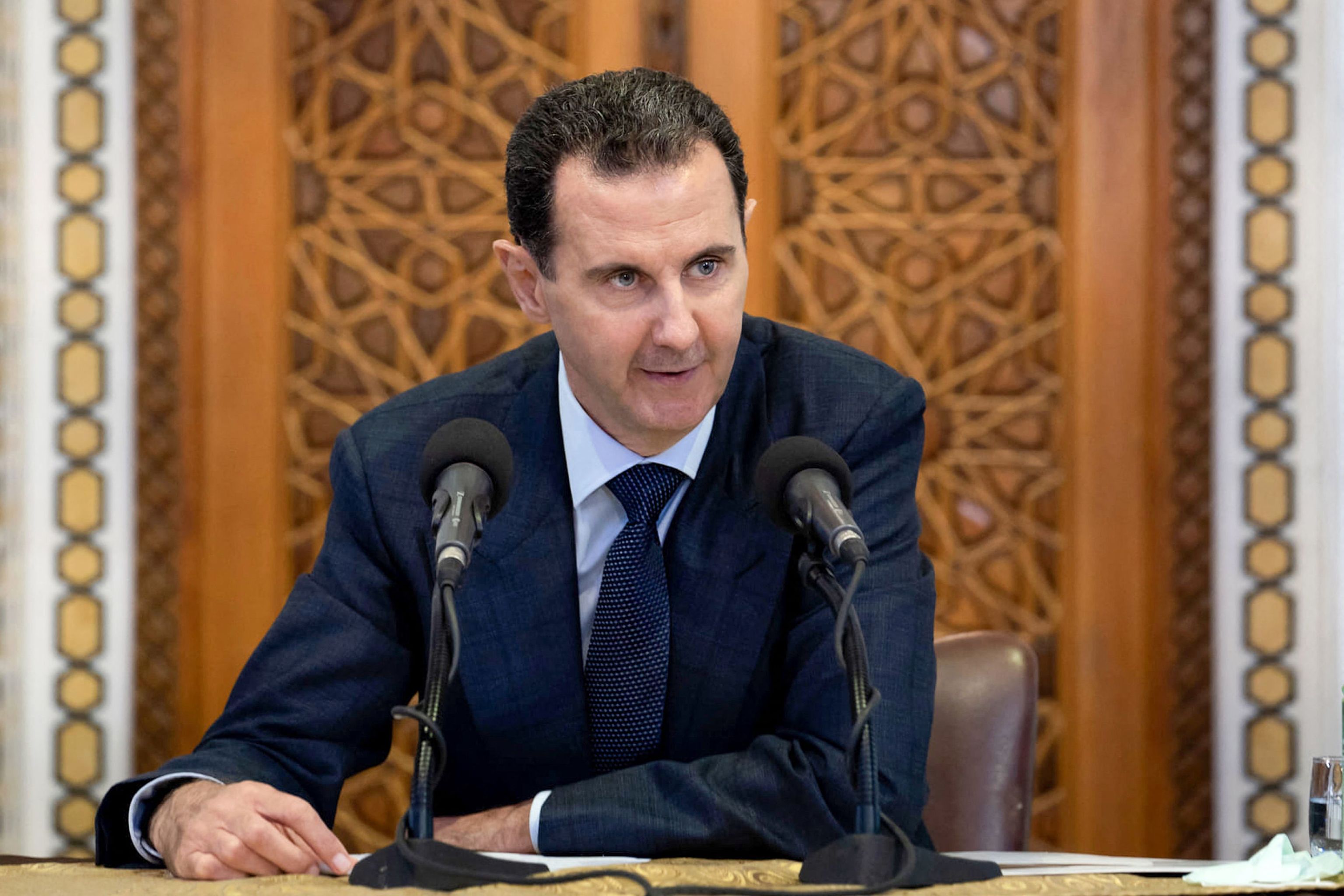Bashar Al-Assad: A Controversial Leader Amidst Syria's Conflict is a topic that has been in the news for many years. Bashar Al-Assad is the current President of Syria, and he has been in power since 2000. During his time as President, Syria has been involved in a civil war that has caused millions of people to flee their homes and has resulted in the deaths of hundreds of thousands of people. Assad has been accused of war crimes and crimes against humanity by the United Nations and other international organizations.
Editor's Notes: "Bashar Al-Assad: A Controversial Leader Amidst Syria's Conflict" have been published today date. This is an important topic to read because it provides insight into the complex conflict in Syria and the role that Bashar Al-Assad has played in it.
Our team of experts has been researching and compiling information on Bashar Al-Assad and the conflict in Syria for many years. We have put together this guide to help you understand the situation and make informed decisions, Explain our effort doing some analysis, digging information, made Bashar Al-Assad: A Controversial Leader Amidst Syria's Conflict we put together this Bashar Al-Assad: A Controversial Leader Amidst Syria's Conflict guide to help target audience make the right decision.
Key Differences or Key Takeaways
Transition to main article topics
FAQ
Bashar Al-Assad, the current President of Syria, has been a controversial figure throughout the Syrian Civil War. Bashar Al-Assad: A Controversial Leader Amidst Syria's Conflict His rule has been marked by allegations of human rights abuses, his use of chemical weapons against his own people, and his close ties to Russia and Iran.

Syria president orders new tax breaks amid rising hardship Syria - Source www.independent.co.uk
Question 1: What are the main accusations against Bashar Al-Assad?
The main accusations against Bashar Al-Assad include the use of chemical weapons against his own people, the arbitrary arrest and torture of civilians, and the indiscriminate bombing of civilian areas.
Question 2: What is the evidence for these accusations?
The evidence for these accusations comes from a variety of sources, including human rights groups, the United Nations, and the Organization for the Prohibition of Chemical Weapons.
Question 3: What has been the international response to these accusations?
The international response to these accusations has been mixed. The United States and its allies have condemned Assad's actions and imposed sanctions on Syria. Russia, on the other hand, has supported Assad and vetoed several Security Council resolutions that would have condemned him.
Question 4: What is the future of Bashar Al-Assad's rule?
The future of Bashar Al-Assad's rule is uncertain. The Syrian Civil War is ongoing, and there is no clear end in sight. Assad has managed to maintain his grip on power, but he faces growing pressure from both domestic and international sources.
Question 5: What are the key takeaways from the situation in Syria?
The key takeaways from the situation in Syria are that the country is in a state of civil war, that Bashar Al-Assad has been accused of committing war crimes, and that the international community is divided on how to respond.
Question 6: What are the next steps for the international community?
The next steps for the international community are to continue to pressure Assad to end the violence, to support the Syrian people, and to work towards a political solution to the conflict.
The situation in Syria is complex and there are no easy answers. The international community must continue to work together to find a way to end the violence and bring peace to the country.
Transition to the next article section: For more information on the Syrian Civil War, please see the following articles:
- Syria: The Conflict Explained
- The Humanitarian Crisis in Syria
- The Role of the International Community in Syria
Tips
The complex and ongoing conflict in Syria presents a multifaceted challenge requiring careful consideration and strategic approaches. Bashar Al-Assad, the embattled leader at the center of this conflict, has adopted certain strategies and tactics to maintain his position amidst the turmoil.
Tip 1: Maintaining Control Over Key Territories
Al-Assad's forces have focused on securing and retaining control over strategically significant territories, including major cities and transportation hubs. This strategy aims to limit the advancement of rebel groups and maintain a semblance of stability in government-held areas.
Tip 2: Utilizing Foreign Support
Al-Assad has sought and received military and political support from Russia and Iran. These partnerships have been crucial in sustaining his regime, providing advanced weaponry, financial assistance, and diplomatic backing.
Tip 3: Exploiting Sectarian Divisions
The conflict in Syria has been influenced by sectarian tensions. Al-Assad has played on these divisions, portraying himself as the protector of minority groups against rebel forces that are predominantly Sunni Muslim.
Tip 4: Ceding Territory for Diplomatic Gains
In certain instances, Al-Assad has been willing to cede territory to rebel groups in exchange for diplomatic recognition or international concessions. This strategy has allowed him to consolidate his position in strategic areas while mitigating pressure from the international community.
Tip 5: Utilizing Negotiation and Reconciliation Efforts
Al-Assad has engaged in negotiations and reconciliation efforts with certain opposition groups, offering concessions and limited political reforms. These measures have been aimed at weakening the rebel front and gaining legitimacy while maintaining his overall control.
Summary
Bashar Al-Assad's leadership during the Syrian conflict has been characterized by a combination of military tactics, political strategies, and diplomatic maneuvering. These approaches have enabled him to maintain his position despite significant challenges, highlighting the complexities of the conflict and the challenges faced by those seeking a resolution.
Bashar Al-Assad: A Controversial Leader Amidst Syria's Conflict
Syrian President Bashar Al-Assad's leadership has been marked by controversy, with his rule characterized by both staunch support and vehement opposition. Amidst Syria's decade-long conflict, key aspects of his presidency include:
- Suppression of Dissent: Assad's government has been accused of human rights abuses, including arbitrary arrests, torture, and extrajudicial killings.
- Foreign Support: Russia and Iran have provided military and economic support to Assad's regime, bolstering his position.
- Civil War: The Syrian Civil War, sparked in part by Assad's crackdown on protests, has resulted in hundreds of thousands of deaths and displaced millions.
- Humanitarian Crisis: Syria faces a severe humanitarian crisis, with millions of people in need of food, shelter, and medical care.
- International Involvement: The United States, Turkey, and other countries have played significant roles in the Syrian conflict, providing aid or supporting various factions.
- Political Future: Assad's political future remains uncertain as the conflict continues and international pressure mounts for a political solution.
These aspects highlight the complex and multifaceted nature of Assad's presidency and the challenges faced by Syria. The conflict has had profound humanitarian consequences, and the international community continues to grapple with the complexities of ending the bloodshed and addressing the underlying causes.

Returning to the Arab fold, Syria's president invited to UAE-hosted - Source www.the-independent.com

Bashar Assad, a former eye doctor who become Syria's accidental heir - Source www.ctvnews.ca
Bashar Al-Assad: A Controversial Leader Amidst Syria’s Conflict
Editor’s Notes: "Bashar Al-Assad: A Controversial Leader Amidst Syria's Conflict" published today, March 8, 2023, is a comprehensive guide to understanding the complex role of Bashar Al-Assad in the ongoing conflict in Syria. This guide draws on extensive research, expert analysis, and a deep understanding of the region to provide a balanced and informative overview of Assad's leadership and its impact on the Syrian people.
At the heart of Syria’s decade-long conflict lies a controversial figure: President Bashar al-Assad. Since inheriting power from his father in 2000, Assad has presided over a brutal civil war that has killed hundreds of thousands of people and displaced millions more. His leadership has been marked by allegations of human rights abuses, war crimes, and the use of chemical weapons against his own people.

China's Xi Jinping meets Syria's Bashar al Assad and announces - Source news.sky.com
Despite international condemnation and calls for his ouster, Assad has clung to power with the support of his allies, including Russia and Iran. His survival has been attributed to a combination of military might, political maneuvering, and the weakness of the opposition. As the conflict continues, Assad remains a central figure in the search for a peaceful resolution.
FAQ
This FAQ section addresses common questions and misconceptions surrounding the controversial figure of Bashar Al-Assad amidst the Syrian conflict. Bashar Al-Assad: A Controversial Leader Amidst Syria's Conflict

These 5 Facts Explain Bashar Assad's Hold in Syria | Time - Source time.com
Question 1: What is the extent of Assad's responsibility for the ongoing conflict in Syria?
Assad's actions and policies, including the brutal suppression of protests and the use of chemical weapons against his own people, have been widely condemned as major contributing factors to the conflict and humanitarian crisis.
Question 2: How has Assad maintained his grip on power despite international pressure and widespread opposition?
Assad has employed a combination of tactics, including the use of military force, political repression, and divide-and-rule strategies to consolidate his power. He has also sought support from allies such as Russia and Iran.
Question 3: What are the international implications of the Syrian conflict and Assad's role in it?
The conflict has sparked a refugee crisis, fueled regional tensions, and provided a breeding ground for extremist groups. Assad's actions have drawn condemnation from the international community and led to economic sanctions.
Question 4: What are the prospects for a political solution to the conflict in Syria?
Efforts to resolve the conflict through negotiations have been hindered by deep-seated mistrust and the lack of a clear path towards reconciliation. Assad's continued presence in power remains a major obstacle to reaching a comprehensive and sustainable solution.
Question 5: How has the conflict affected the lives of ordinary Syrians?
The conflict has caused widespread destruction, displacement, and suffering. Millions of Syrians have been forced to flee their homes, and countless lives have been lost.
Question 6: What is the international community's responsibility towards the Syrian people?
The international community has a moral obligation to provide humanitarian assistance to the Syrian people and support efforts to achieve a just and sustainable resolution to the conflict.
In conclusion, the Syrian conflict remains a complex and multifaceted issue, and the figure of Bashar Al-Assad is a controversial one. By addressing common questions and highlighting key aspects of the situation, this FAQ aims to shed light on the complexities of the conflict and its far-reaching implications.
For further insights into the ongoing conflict and the role of Bashar Al-Assad, please refer to our in-depth article: Bashar Al-Assad: A Controversial Leader Amidst Syria's Conflict
Tips
Syrian President Bashar al-Assad has been a controversial figure throughout the Syrian conflict, with supporters and detractors alike. Here are some insights into his leadership and Syria's ongoing crisis.

Assad’s 2nd Diplomatic Trip in Days Speeds Easing of Isolation - The - Source www.nytimes.com
Tip 1: Understand the Complexities of the Conflict
The Syrian conflict is a multi-faceted crisis involving various political, sectarian, and regional actors. Comprehending the intricate dynamics and interests at play is crucial for informed analysis.
Tip 2: Consider the Role of International Interference
Foreign powers, including Russia, the United States, and Turkey, have significantly influenced the conflict. Recognizing their motives and strategic calculations provides a broader perspective.
Tip 3: Examine Assad's Political Strategies
Assad has employed a combination of military force and political tactics to maintain control. Studying his strategies, including alliances with different groups and the use of propaganda, helps understand his resilience.
Tip 4: Assess the Impact on the Syrian People
The humanitarian crisis in Syria is immense. Investigating the plight of civilians, including displacement, poverty, and access to essential services, provides insights into the conflict's human toll.
Tip 5: Follow Credible Sources
With conflicting information circulating, it's essential to rely on reputable and unbiased sources for news and analysis. Verifying information from various perspectives ensures a more balanced understanding.
In conclusion, Bashar al-Assad's leadership in Syria has been characterized by both controversy and resilience. By considering these tips, one can gain a deeper understanding of the complex factors at play and the ongoing challenges facing the nation.
Bashar Al-Assad: A Controversial Leader Amidst Syria's Conflict
Bashar Al-Assad's rule has been marked by significant challenges and controversies. From his rise to power to the ongoing conflict in Syria, his leadership has had a profound impact on the nation and the region. Here are six key aspects that shed light on his controversial role:
- Background and Inheritance: Son of former President Hafez Al-Assad, Bashar inherited a legacy of authoritarian rule.
- Initial Reforms and Hopes: Upon taking office in 2000, Assad initially pursued some reforms, raising hopes for change.
- Civil War and Repression: The 2011 Arab Spring protests turned into a civil war, with Assad accused of brutalizing his opponents.
- International Involvement: Syria's conflict drew in numerous global actors, complicating Assad's position.
- Humanitarian Crisis: The war has displaced millions and caused widespread suffering, attributed in part to Assad's actions.
- Diplomatic Isolation: Assad's role in the conflict has led to Western governments isolating Syria diplomatically.

Bashar al-Assad – ögonläkaren som blev en ökänd despot 31 oktober 2021 - Source sverigesradio.se
These key aspects intertwine, shaping Assad's controversial legacy. His initial reforms contrasted with his later brutal repression, highlighting the complexities of his rule. The civil war and international involvement have amplified Syria's humanitarian crisis, demonstrating the far-reaching consequences of Assad's actions. Diplomatic isolation has further complicated efforts to resolve the conflict, underlining the international dimensions of Syria's turmoil.

Here's what you need to know about Assad's interview in al-Manar TV - Source www.albawaba.com
Bashar Al-Assad: A Controversial Leader Amidst Syria's Conflict
At the heart of the Syrian conflict lies a controversial figure: Bashar Al-Assad, the country's president since 2000. His presidency has been marked by political turmoil, corruption accusations, and human rights violations. The conflict, sparked in 2011 by the Arab Spring, further cemented Assad's notoriety as he responded to nationwide protests with brutal force.

Bashar al-Assad aprueba una amnistía general que cambia penas de muerte - Source www.elmundo.es
Assad's leadership has been a decisive element in shaping the course of the Syrian conflict. His refusal to step down in the face of widespread protests, allegations of chemical weapons use, and his alliance with Russia and Iran have prolonged the conflict and caused widespread suffering. At the same time, his military campaigns against rebel groups have retaken much of the country's territory, further consolidating his grip on power.
The practical significance of understanding Assad's role in the conflict is multifold. It provides context to the complexities of the Syrian situation, allowing for more informed policy decisions and humanitarian aid efforts. It also underscores the destructive impact of authoritarianism and the importance of democratic transitions. Furthermore, it can help prevent similar conflicts by identifying the root causes and fostering international cooperation in addressing them.
Table: Key Insights on Bashar Al-Assad's Controversial Leadership and the Syrian Conflict
| Aspect | Key Insights |
|---|---|
| Political Turmoil | Assad's authoritarian rule and suppression of dissent sparked the Syrian conflict. |
| Human Rights Violations | Allegations of chemical weapons use, torture, and arbitrary detention stain Assad's presidency. |
| Conflict and Displacement | Assad's military campaigns have displaced millions of Syrians and led to a humanitarian crisis. |
| International Involvement | Assad's alliances with Russia and Iran have prolonged the conflict and complicated international efforts. |
Conclusion
Bashar Al-Assad's controversial leadership has been a pivotal factor in the protracted agony of the Syrian conflict. His authoritarian rule, suppression of dissent, and alleged human rights violations fueled the initial unrest, while his military campaigns and international alliances worsened the crisis.
The lessons learned from Assad's leadership highlight the dangers of authoritarianism, the importance of democratic transitions, and the need for international cooperation in addressing complex conflicts. As the situation in Syria evolves, understanding the role played by controversial leaders like Assad will be crucial in fostering stability and preventing future tragedies.
